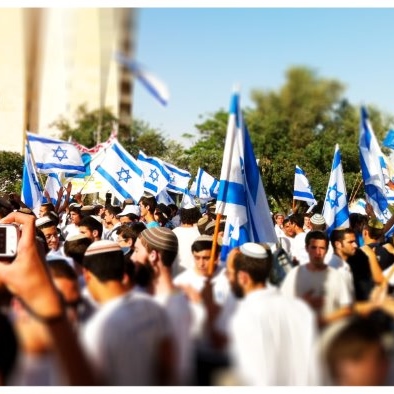
Featured Item

Why is Yom Yerushalayim so controversial?
TALI FEINBERG
As someone who hails from Australia, Flesher understands that diaspora communities may see the day like any other chag (holiday). But in Jerusalem itself – and in Israel – it remains a controversial event that many people refuse to celebrate.
“Commemorating the date when Israel won control over the Old City from the Jordanians in the 1967 Six-Day War, including Judaism’s holiest sites, it also marks the start of military rule in the West Bank and the beginning of a new stage of the Israel-Palestinian conflict,” writes Jessica Steinberg in the Times of Israel.
“I cannot celebrate Yom Yerushalayim. It’s not because I don’t feel immense pride in our stunning victory against what seemed insurmountable odds in the Six-Day War, ensuring our survival. I do. It’s not because I am not happy that our capital was reunited, I am,” says Paul Mirbach, an ex-South African Israeli living on Kibbutz Tuval.
“It’s because of what this day has come to mean over the past fifty years. It symbolises the day when we became oppressors of another people. It symbolises the beginning of the erosion of our sense of justice and our moral fibre. So, I acknowledge this day with mixed emotions.”
Another reason the day isn’t celebrated in Jerusalem is because the majority of its population are Arab Palestinians. “Of the 874 186 residents of East and West Jerusalem today, 38% are Arab Palestinians, and 27% are Haredi Jews.
“For Palestinian residents of Jerusalem, the Jewish celebration, flag waving, and racist chants that some religious Zionists hurl at Arab shopkeepers as they enter the Old City waving flags make this an especially sad and angry day for Palestinians,” says Flesher, pointing out that most people who take part in this parade don’t live in Jerusalem.
In fact, just last week, Israel’s Supreme Court turned down a petition to change the route of the parade so that it went around, rather than directly through, the Muslim Quarter of the city. This means that tensions can flare up on the day.
“For Haredi Jerusalemites, whose representatives now dominate the Jerusalem municipality, the day is also no cause for celebration, although few would protest the day as would the Palestinians. According to a Jerusalem Post poll, only 13% of Haredim see Jerusalem day as special. This is connected to the fact that the day is not of Biblical origin, and the rituals around it for religious Zionists are not endorsed by Haredi rabbis, who are largely non-Zionist in Jerusalem,” says Flesher.
“Unlike other Jewish festivals that have existed for thousands of years, Yom Yerushalayim is a modern day. For the same reason most Haredim don’t observe new Zionist festivals such as Yom Hashoah, Ha’atzmaut, and Hazikaron, they generally don’t observe Yom Yerushalayim as well,” he says.
So, how should we observe Yom Yerushalayim if we want to celebrate it? “In past years, alternate groups have been finding new ways to mark the day,” says Flesher. He feels that diaspora communities could host more introspective events that ask questions, engage with the issues, and promote the diversity of Jerusalem.
“For a day meant to mark the unification of the city, the march and other events can seem to highlight the capital’s divisions, and many Jerusalemites seek other, more tolerant ways to mark the date,” says Steinberg in her article.
She spoke to the Jerusalem Tolerance group, which hosts the Jerusalem Day of Diversity, a two-day event that is meant to reclaim the festival as one of tolerance, rather than division. Four years ago, Michal Shilor, one of the organisers, noted the utter lack of any events revolving around Jerusalem Day despite the number of tolerance organisations in the city.
“Everyone was scared to touch it,” said Shilor, 28. She said they wanted to take the 36 hours around the national day, and do something with them. They thought they would have ten or 15 events, and ended up with 80.
Tens of thousands of people attend everything from conversations about Jerusalem taking place in people’s living rooms, to a women’s gospel choir at the Davidka station, to joining the now well-known “flower march” organised by fellow organisation Tag Meir, which hands out flowers to residents and the businesspeople of the Old City.
“We’re creating a new narrative for this city,” said Shilor. “It isn’t perfect, but it’s from a huge range of people who live here and create this day together, tagging it as a city of global tolerance.”




